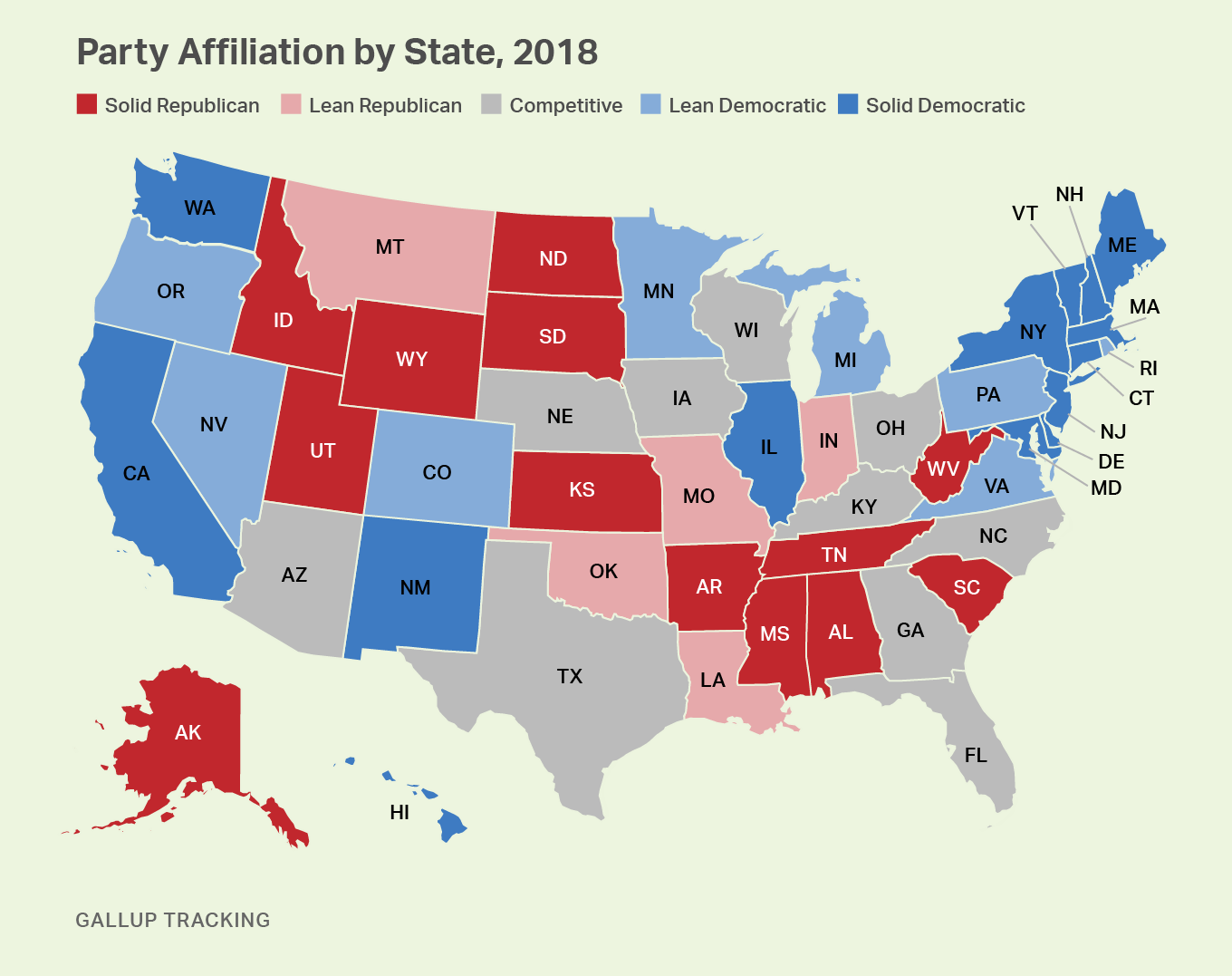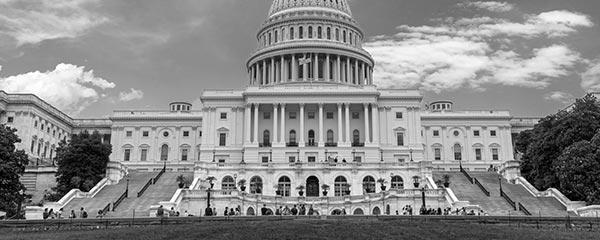WASHINGTON, D.C. -- In 2018, 22 U.S. states were Democratic in party orientation, based on the party preferences or leanings of their residents. Another 18 were Republican and 10 were competitive. That four-state Democratic advantage is typical of what Gallup has found in recent years, though Democrats enjoyed much larger leads in 2008 and 2009, and Republican states outnumbered Democratic ones in 2015 and 2016.
| Solid Democratic | Lean Democratic | Competitive | Lean Republican | Solid Republican | Net Democratic | ||||||||||||||||||||||||||||||||||||||||||||||||||||||||||||||||||||||||||||||||||||||||||||||
|---|---|---|---|---|---|---|---|---|---|---|---|---|---|---|---|---|---|---|---|---|---|---|---|---|---|---|---|---|---|---|---|---|---|---|---|---|---|---|---|---|---|---|---|---|---|---|---|---|---|---|---|---|---|---|---|---|---|---|---|---|---|---|---|---|---|---|---|---|---|---|---|---|---|---|---|---|---|---|---|---|---|---|---|---|---|---|---|---|---|---|---|---|---|---|---|---|---|---|---|
| 2018 | 14 | 8 | 10 | 5 | 13 | +4 | |||||||||||||||||||||||||||||||||||||||||||||||||||||||||||||||||||||||||||||||||||||||||||||
| 2017 | 15 | 4 | 15 | 3 | 13 | +3 | |||||||||||||||||||||||||||||||||||||||||||||||||||||||||||||||||||||||||||||||||||||||||||||
| 2016 | 13 | 1 | 15 | 7 | 14 | -7 | |||||||||||||||||||||||||||||||||||||||||||||||||||||||||||||||||||||||||||||||||||||||||||||
| 2015 | 11 | 3 | 16 | 8 | 12 | -6 | |||||||||||||||||||||||||||||||||||||||||||||||||||||||||||||||||||||||||||||||||||||||||||||
| 2014 | 11 | 6 | 18 | 5 | 10 | +2 | |||||||||||||||||||||||||||||||||||||||||||||||||||||||||||||||||||||||||||||||||||||||||||||
| 2013 | 12 | 5 | 19 | 2 | 12 | +3 | |||||||||||||||||||||||||||||||||||||||||||||||||||||||||||||||||||||||||||||||||||||||||||||
| 2012 | 13 | 6 | 19 | 3 | 9 | +7 | |||||||||||||||||||||||||||||||||||||||||||||||||||||||||||||||||||||||||||||||||||||||||||||
| 2011 | 11 | 7 | 15 | 7 | 10 | +1 | |||||||||||||||||||||||||||||||||||||||||||||||||||||||||||||||||||||||||||||||||||||||||||||
| 2010 | 13 | 9 | 18 | 5 | 5 | +12 | |||||||||||||||||||||||||||||||||||||||||||||||||||||||||||||||||||||||||||||||||||||||||||||
| 2009 | 23 | 10 | 12 | 1 | 4 | +28 | |||||||||||||||||||||||||||||||||||||||||||||||||||||||||||||||||||||||||||||||||||||||||||||
| 2008 | 29 | 6 | 10 | 1 | 4 | +30 | |||||||||||||||||||||||||||||||||||||||||||||||||||||||||||||||||||||||||||||||||||||||||||||
| Solid states are those in which a party has a 10-point or greater advantage; leaning states are those in which a party has an advantage of more than five points but fewer than 10 points. Competitive states are those in which the party advantage is five points or less. | |||||||||||||||||||||||||||||||||||||||||||||||||||||||||||||||||||||||||||||||||||||||||||||||||||
| Gallup | |||||||||||||||||||||||||||||||||||||||||||||||||||||||||||||||||||||||||||||||||||||||||||||||||||
These figures reflect a net increase since 2017 in the number of Democratic (three) and Republican (two) states, with a corresponding decline in the number of competitive states. New Hampshire, Nevada and Pennsylvania moved from competitive to Democratic. West Virginia, Louisiana and Indiana shifted from competitive to Republican, while Nebraska went from Republican to competitive.
The results are based on the average party affiliation of each state's residents throughout 2018, using aggregated data from Gallup's U.S. tracking poll. Gallup asked all poll respondents to indicate whether they identify as a Republican, a Democrat or an independent. Independents were then probed as to whether they lean toward the Republican or the Democratic Party. The figures that form the basis of the state's party classification -- shown for each state at the end of the article -- are the percentage of state residents who identify as Democrats or lean Democratic minus the percentage who identify as Republicans or lean Republican.
States in which there is a 10-percentage-point or greater advantage for one party are considered "solid" for that party. States in which there is an advantage for a party of more than five points but fewer than 10 points are considered "leaning" toward the party, while those in which the parties are within five points of each other are considered competitive.
The most Republican states are found largely in the South and Mountain West, while the most Democratic states are in the Northeast and on the West Coast.

Massachusetts was the single most Democratic state in 2018, with a Democratic advantage of 29 points -- 56% of residents identified as Democrats or leaned Democratic, while 27% identified as Republican or leaned Republican.
Massachusetts also ranked as the most Democratic state in 2017 and 2014 and has been second on four other occasions since 2008. Vermont (2015 and 2016), New York (2013), Hawaii (2011-2012), Maryland (2010) and Rhode Island (2008-2009) have ranked as the most Democratic in other years.
Wyoming was the most Republican state in 2018, with 59% of its residents identifying as Republican or leaning Republican and 25% identifying as Democratic or leaning Democratic.
Wyoming has been the most Republican state eight times since 2008, including the past six years as well as in 2009 and 2010. Utah was the most Republican state in 2008, 2011 and 2012.
| Democrat/Lean Democratic | Republican/Lean Republican | Democratic advantage | N | Classification | |||||||||||||||||||||||||||||||||||||||||||||||||||||||||||||||||||||||||||||||||||||||||||||||
|---|---|---|---|---|---|---|---|---|---|---|---|---|---|---|---|---|---|---|---|---|---|---|---|---|---|---|---|---|---|---|---|---|---|---|---|---|---|---|---|---|---|---|---|---|---|---|---|---|---|---|---|---|---|---|---|---|---|---|---|---|---|---|---|---|---|---|---|---|---|---|---|---|---|---|---|---|---|---|---|---|---|---|---|---|---|---|---|---|---|---|---|---|---|---|---|---|---|---|---|
| % | % | pct. pts. | |||||||||||||||||||||||||||||||||||||||||||||||||||||||||||||||||||||||||||||||||||||||||||||||||
| Massachusetts | 56 | 27 | 29 | 1,623 | Strong Democratic | ||||||||||||||||||||||||||||||||||||||||||||||||||||||||||||||||||||||||||||||||||||||||||||||
| Vermont | 55 | 30 | 25 | 249 | Strong Democratic | ||||||||||||||||||||||||||||||||||||||||||||||||||||||||||||||||||||||||||||||||||||||||||||||
| Hawaii | 54 | 29 | 25 | 301 | Strong Democratic | ||||||||||||||||||||||||||||||||||||||||||||||||||||||||||||||||||||||||||||||||||||||||||||||
| New York | 53 | 30 | 23 | 4,591 | Strong Democratic | ||||||||||||||||||||||||||||||||||||||||||||||||||||||||||||||||||||||||||||||||||||||||||||||
| Maryland | 54 | 31 | 23 | 1,337 | Strong Democratic | ||||||||||||||||||||||||||||||||||||||||||||||||||||||||||||||||||||||||||||||||||||||||||||||
| California | 51 | 31 | 20 | 8,116 | Strong Democratic | ||||||||||||||||||||||||||||||||||||||||||||||||||||||||||||||||||||||||||||||||||||||||||||||
| Connecticut | 52 | 33 | 19 | 927 | Strong Democratic | ||||||||||||||||||||||||||||||||||||||||||||||||||||||||||||||||||||||||||||||||||||||||||||||
| Illinois | 50 | 34 | 16 | 2,374 | Strong Democratic | ||||||||||||||||||||||||||||||||||||||||||||||||||||||||||||||||||||||||||||||||||||||||||||||
| New Jersey | 50 | 35 | 15 | 1,860 | Strong Democratic | ||||||||||||||||||||||||||||||||||||||||||||||||||||||||||||||||||||||||||||||||||||||||||||||
| Washington | 50 | 35 | 15 | 1,980 | Strong Democratic | ||||||||||||||||||||||||||||||||||||||||||||||||||||||||||||||||||||||||||||||||||||||||||||||
| Maine | 50 | 37 | 13 | 412 | Strong Democratic | ||||||||||||||||||||||||||||||||||||||||||||||||||||||||||||||||||||||||||||||||||||||||||||||
| Delaware | 48 | 35 | 13 | 250 | Strong Democratic | ||||||||||||||||||||||||||||||||||||||||||||||||||||||||||||||||||||||||||||||||||||||||||||||
| New Hampshire | 48 | 36 | 12 | 350 | Strong Democratic | ||||||||||||||||||||||||||||||||||||||||||||||||||||||||||||||||||||||||||||||||||||||||||||||
| New Mexico | 48 | 38 | 10 | 653 | Strong Democratic | ||||||||||||||||||||||||||||||||||||||||||||||||||||||||||||||||||||||||||||||||||||||||||||||
| Oregon | 47 | 38 | 9 | 1,316 | Lean Democratic | ||||||||||||||||||||||||||||||||||||||||||||||||||||||||||||||||||||||||||||||||||||||||||||||
| Minnesota | 46 | 38 | 8 | 1,507 | Lean Democratic | ||||||||||||||||||||||||||||||||||||||||||||||||||||||||||||||||||||||||||||||||||||||||||||||
| Rhode Island | 43 | 36 | 7 | 298 | Lean Democratic | ||||||||||||||||||||||||||||||||||||||||||||||||||||||||||||||||||||||||||||||||||||||||||||||
| Virginia | 46 | 39 | 7 | 2,022 | Lean Democratic | ||||||||||||||||||||||||||||||||||||||||||||||||||||||||||||||||||||||||||||||||||||||||||||||
| Colorado | 47 | 40 | 7 | 1,549 | Lean Democratic | ||||||||||||||||||||||||||||||||||||||||||||||||||||||||||||||||||||||||||||||||||||||||||||||
| Nevada | 45 | 38 | 7 | 647 | Lean Democratic | ||||||||||||||||||||||||||||||||||||||||||||||||||||||||||||||||||||||||||||||||||||||||||||||
| Pennsylvania | 46 | 40 | 6 | 3,272 | Lean Democratic | ||||||||||||||||||||||||||||||||||||||||||||||||||||||||||||||||||||||||||||||||||||||||||||||
| Michigan | 45 | 39 | 6 | 2,319 | Lean Democratic | ||||||||||||||||||||||||||||||||||||||||||||||||||||||||||||||||||||||||||||||||||||||||||||||
| Georgia | 43 | 42 | 1 | 2,214 | Competitive | ||||||||||||||||||||||||||||||||||||||||||||||||||||||||||||||||||||||||||||||||||||||||||||||
| Florida | 42 | 41 | 1 | 4,709 | Competitive | ||||||||||||||||||||||||||||||||||||||||||||||||||||||||||||||||||||||||||||||||||||||||||||||
| Wisconsin | 43 | 43 | 0 | 1,447 | Competitive | ||||||||||||||||||||||||||||||||||||||||||||||||||||||||||||||||||||||||||||||||||||||||||||||
| Iowa | 42 | 42 | 0 | 825 | Competitive | ||||||||||||||||||||||||||||||||||||||||||||||||||||||||||||||||||||||||||||||||||||||||||||||
| Arizona | 41 | 41 | 0 | 948 | Competitive | ||||||||||||||||||||||||||||||||||||||||||||||||||||||||||||||||||||||||||||||||||||||||||||||
| Nebraska | 42 | 43 | -1 | 507 | Competitive | ||||||||||||||||||||||||||||||||||||||||||||||||||||||||||||||||||||||||||||||||||||||||||||||
| North Carolina | 41 | 42 | -1 | 2,433 | Competitive | ||||||||||||||||||||||||||||||||||||||||||||||||||||||||||||||||||||||||||||||||||||||||||||||
| Kentucky | 42 | 45 | -3 | 1,124 | Competitive | ||||||||||||||||||||||||||||||||||||||||||||||||||||||||||||||||||||||||||||||||||||||||||||||
| Texas | 39 | 42 | -3 | 5,898 | Competitive | ||||||||||||||||||||||||||||||||||||||||||||||||||||||||||||||||||||||||||||||||||||||||||||||
| Ohio | 41 | 45 | -4 | 2,629 | Competitive | ||||||||||||||||||||||||||||||||||||||||||||||||||||||||||||||||||||||||||||||||||||||||||||||
| Montana | 39 | 46 | -7 | 427 | Lean Republican | ||||||||||||||||||||||||||||||||||||||||||||||||||||||||||||||||||||||||||||||||||||||||||||||
| Indiana | 38 | 46 | -8 | 1,575 | Lean Republican | ||||||||||||||||||||||||||||||||||||||||||||||||||||||||||||||||||||||||||||||||||||||||||||||
| Louisiana | 37 | 45 | -8 | 1,117 | Lean Republican | ||||||||||||||||||||||||||||||||||||||||||||||||||||||||||||||||||||||||||||||||||||||||||||||
| Oklahoma | 38 | 46 | -8 | 1,073 | Lean Republican | ||||||||||||||||||||||||||||||||||||||||||||||||||||||||||||||||||||||||||||||||||||||||||||||
| Missouri | 38 | 47 | -9 | 1,532 | Lean Republican | ||||||||||||||||||||||||||||||||||||||||||||||||||||||||||||||||||||||||||||||||||||||||||||||
| South Carolina | 37 | 47 | -10 | 1,262 | Strong Republican | ||||||||||||||||||||||||||||||||||||||||||||||||||||||||||||||||||||||||||||||||||||||||||||||
| South Dakota | 40 | 51 | -11 | 303 | Strong Republican | ||||||||||||||||||||||||||||||||||||||||||||||||||||||||||||||||||||||||||||||||||||||||||||||
| Kansas | 36 | 47 | -11 | 746 | Strong Republican | ||||||||||||||||||||||||||||||||||||||||||||||||||||||||||||||||||||||||||||||||||||||||||||||
| West Virginia | 37 | 49 | -12 | 445 | Strong Republican | ||||||||||||||||||||||||||||||||||||||||||||||||||||||||||||||||||||||||||||||||||||||||||||||
| Mississippi | 36 | 48 | -12 | 666 | Strong Republican | ||||||||||||||||||||||||||||||||||||||||||||||||||||||||||||||||||||||||||||||||||||||||||||||
| Tennessee | 35 | 48 | -13 | 1,692 | Strong Republican | ||||||||||||||||||||||||||||||||||||||||||||||||||||||||||||||||||||||||||||||||||||||||||||||
| Arkansas | 35 | 48 | -13 | 758 | Strong Republican | ||||||||||||||||||||||||||||||||||||||||||||||||||||||||||||||||||||||||||||||||||||||||||||||
| Idaho | 34 | 50 | -16 | 591 | Strong Republican | ||||||||||||||||||||||||||||||||||||||||||||||||||||||||||||||||||||||||||||||||||||||||||||||
| Alabama | 35 | 52 | -17 | 1,275 | Strong Republican | ||||||||||||||||||||||||||||||||||||||||||||||||||||||||||||||||||||||||||||||||||||||||||||||
| Alaska | 33 | 51 | -18 | 232 | Strong Republican | ||||||||||||||||||||||||||||||||||||||||||||||||||||||||||||||||||||||||||||||||||||||||||||||
| North Dakota | 30 | 55 | -25 | 241 | Strong Republican | ||||||||||||||||||||||||||||||||||||||||||||||||||||||||||||||||||||||||||||||||||||||||||||||
| Utah | 28 | 56 | -28 | 952 | Strong Republican | ||||||||||||||||||||||||||||||||||||||||||||||||||||||||||||||||||||||||||||||||||||||||||||||
| Wyoming | 25 | 59 | -34 | 286 | Strong Republican | ||||||||||||||||||||||||||||||||||||||||||||||||||||||||||||||||||||||||||||||||||||||||||||||
| Based on 2018 Gallup tracking. Data for AK, DE, HI, ND, RI, SD, VT and WY based on combined data from 2018 Gallup tracking and 2018 Gallup Poll Social Series surveys. | |||||||||||||||||||||||||||||||||||||||||||||||||||||||||||||||||||||||||||||||||||||||||||||||||||
| Gallup | |||||||||||||||||||||||||||||||||||||||||||||||||||||||||||||||||||||||||||||||||||||||||||||||||||
Editor's Note: The story has been updated to correct the sample size of national adults.



